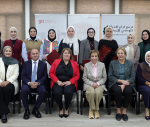You are here
Saving the Dead Sea
Jan 06,2019 - Last updated at Jan 06,2019
Scientists, environmentalists, ecologists and others are all sounding the alarm, once again, that the Dead Sea is fast shrinking, and that at this rate it will become a tiny pool by the middle of this century.
Experts say that the level of the Dead Sea is receding by 1.5 metres per year! One does not have to be an expert to realise that the lake is really getting smaller and smaller by the year, as hotels and resort facilities that were once well placed at the shoreline of the lake’s water are now left far behind, with no easy access to it.
Of course, the reasons are many but the most obvious ones among them, and on which there is unanimity among the experts, are the rapid depletion of water sources in the area, the drying up of the Jordan River that was once the principle source of water that replenished the Dead Sea and last, but not least, the mushrooming of mining factories in and around the Dead Sea, extracting potash and other chemicals from it.
The upshot of this alarming narrative is that unless countries surrounding the dying lake start jointly and cooperatively doing something fast and effective about this regional challenge, they are going to find themselves without a historic and natural wonder.
There is, therefore, an urgent need for regional cooperation that transcends political divisions, since as long as countries remain at loggerheads over the regional geopolitical conflicts, at the top of which is, of course, the Palestinian crisis, the demise of the salty lake could become a sure thing and the first casualty.
Maybe, just maybe, the saving of the Dead Sea form disappearance from the surface of the world will create new mindsets in the region, and form a catalyst for not only saving it from disappearance, but also to solve the endemic regional conflicts as well. Above all, Israel must change its geopolitical perspective vis-à-vis the Arab states as well as on the Palestinian people and become a true and positive member of the region.














